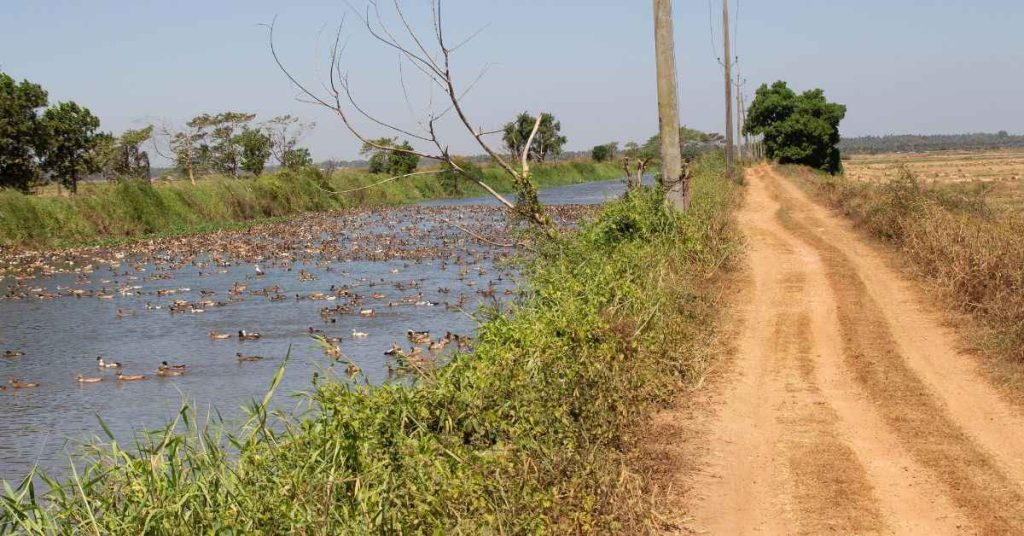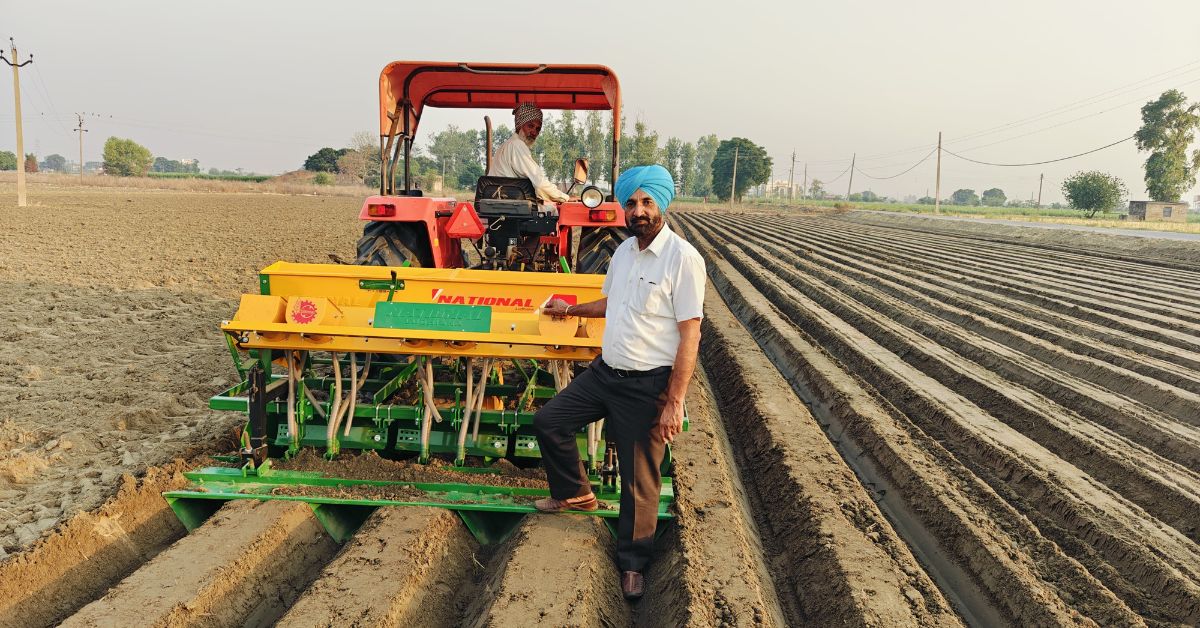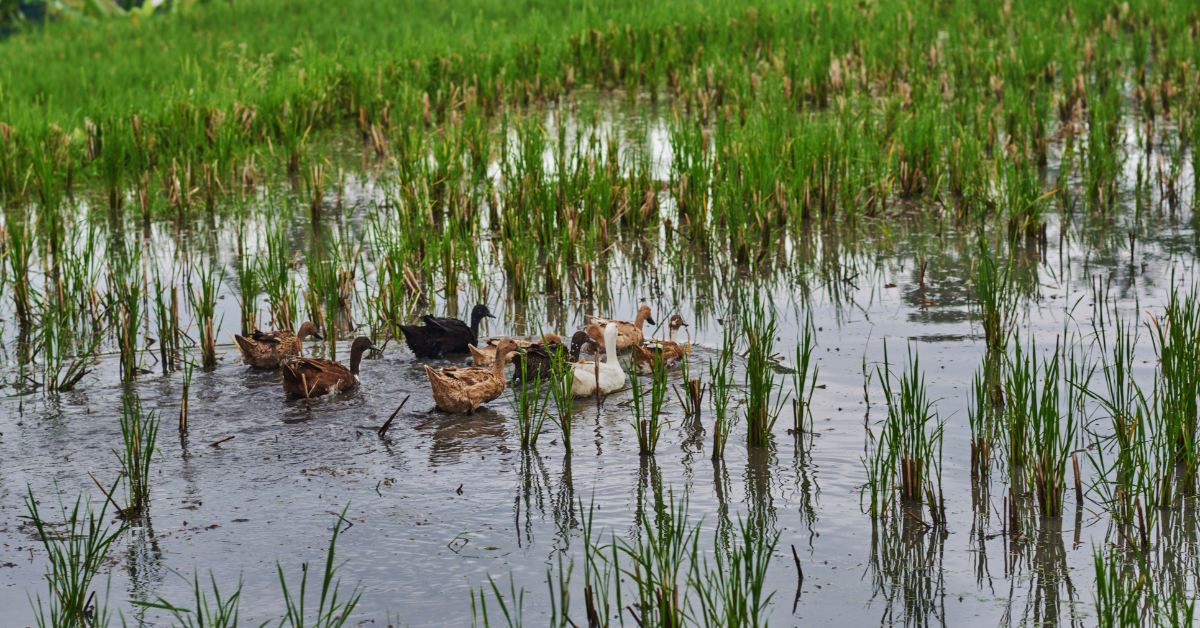Tags
Why Farmers Are Replacing Pesticides With Ducks This Kharif Farming Season.
This Kharif season, farmers across India are turning to smart, sustainable methods—like using ducks to manage pests and choosing climate-resilient seeds—to grow better crops with fewer resources. These practical techniques are helping protect the environment while improving harvests. Here’s how more farmers can make the shift this season.
By Shivani Gupta.

Often reliant on excessive water usage and chemical inputs, the traditional farming practices contribute to the degradation of natural resources and the depletion of freshwater reserves.
Adopting sustainable agriculture is imperative for India to ensure long-term food security, improve farmers’ livelihoods, and protect the environment. As India strives to meet its developmental goals, promoting and implementing sustainable practices can significantly contribute to a healthier planet and a robust economy.
In view of the persistent issues, we have curated a list of sustainable techniques for farmers to consider adopting this Kharif season.
1. Adopt climate-resilient seeds
Recently, India unveiled revolutionary genome-edited rice varieties, DRR Dhan 100 (Kamala) and Pusa DST Rice 1, developed by the IARI and Indian Rice Research Institute. Using the SDN1 genome editing technique, these innovations enhance two major rice types — Samba Mahsuri (BPT5204) and MTU1010 — with precise DNA alterations.
Without introducing foreign genes, it is expected to boost yields by 30 percent. The usage of such seeds will help reduce irrigation water usage by about 7,500 million cubic metres. The seeds also have improved tolerance to drought and salinity, ensuring crop stability amidst changing climatic conditions.
Cultivation on five million hectares promises 4.5 million tonnes of additional paddy and reduces greenhouse gas emissions by 20 percent. These efforts signal India’s leadership in sustainable agriculture and climate-smart technology.
2. Irrigate fields with just 25% water
Traditional paddy farming consumes up to 4,000 litres of water per kilogram of rice, as fields remain flooded to control weeds, depleting the water table. In view of the depleting groundwater levels in Punjab, former IAS officer Kahan Singh Pannu innovated the Seeding of Rice on Beds (SRB) technique.

The technique involves machines preparing beds and planting seeds, supplying water only to furrows between beds as needed, thus reducing water use by 75 percent compared to traditional methods. This method conserves water and reduces irrigation costs, advocating for conservation-focused agriculture.
3. Enhancing soil health with nature’s little helpers: ducks
Ducks play a crucial role in Kerala’s rice farming. After harvesting their paddy crops, farmers release ducks into their fields where ducks consume leftover grains, weeds, and worms, and naturally clean the fields while controlling pests without chemicals.

This grazing enriches the soil with organic nutrients from their droppings, preparing it for the next crop cycle. The ducks graze for a few weeks post-harvest and return briefly after new seedlings are planted, aiding in weed control and gently tilling the topsoil for organic manure integration.
4. How to effectively utilise paddy waste
In India, paddy is typically harvested in September and October, aligning with the end of the monsoon. In a bid to quickly clear fields for the subsequent wheat (Rabi) crop, farmers resort to setting fire to leftover straw after rice harvests. It leads to severe air pollution, affecting the environment and public health.
Innovative solutions are emerging to combat this issue. Debashree Padhi from Bhubaneshwar developed ‘Agnis’, cooking stoves using agro-mass pellets made from agricultural residue, jaggery, limestone, and clay, tackling air pollution from biomass fuels and stubble burning.
Another individual, Sukhbir Dhaliwal’s Farm2Energy, aids farmers by collecting stubble at no cost. He processes stubble waste into bio-pellets, biochar, and torrefied pellets, thus turning waste into beneficial resources.
Edited by Vidya Gowri.
https://thebetterindia.com/451384/sustainable-farming-methods-for-farmers-to-adopt-this-kharif-monsoon-season/Published Date: June 21, 2025






